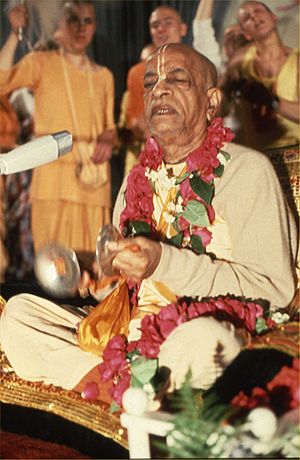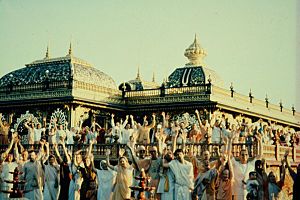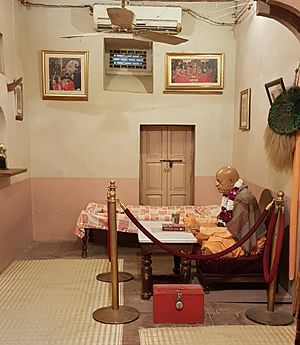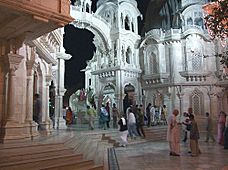A. C. Bhaktivedanta Swami Prabhupada facts for kids
Quick facts for kids His Divine Grace A. C. Bhaktivedanta Swami Prabhupāda |
|
|---|---|

A. C. Bhaktivedanta Swami in Germany, 1974
|
|
| Religion | Hinduism |
| Denomination | Vaishnavism |
| Sect | Gaudiya Vaishnavism |
| Temple | Gaudiya Math, ISKCON |
| Philosophy | Bhakti yoga |
| Alma mater | Scottish Church College, University of Calcutta |
| Monastic name | Abhaya Caraṇāravinda Bhakti-vedānta Svāmī |
| Personal | |
| Born | Abhay Charan De 1 September 1896 Calcutta, Bengal Presidency, British India |
| Died | 14 November 1977 (aged 81) Vrindavan, Uttar Pradesh, India |
| Resting place | Srila Prabhupada's Samadhi Mandir, ISKCON Vrindavan 27°34′19″N 77°40′38″E / 27.57196°N 77.67729°E |
| Religious career | |
| Period in office | 1966–1977 |
| Works | Bhagavad-Gītā As It Is, Śrīmad Bhāgavatam (translation), Caitanya Caritāmṛta (trans.) |
| Initiation | Diksha, 1933 (by Bhaktisiddhanta Sarasvati) Sannyasa, 1959 (by Bhakti Prajnan Keshava) |
| Post | Founder-Acharya of ISKCON |
Abhay Charanaravinda Bhaktivedanta Swami (IAST: Abhaya Caraṇāravinda Bhakti-vedānta Svāmī; 1 September 1896 – 14 November 1977) was an Indian Gaudiya Vaishnava spiritual teacher. He founded the ISKCON, often called the "Hare Krishna movement". People in ISKCON see Bhaktivedanta Swami as a special messenger of Chaitanya Mahaprabhu.
He was born in Calcutta (now Kolkata). He studied at the Scottish Church College. After working in a small business, he met his spiritual teacher, Bhaktisiddhanta Sarasvati. In 1959, he became a sannyasi, which means he gave up worldly life. He then started writing about Vaishnava scriptures. As a traveling monk, he shared Gaudiya Vaishnavite ideas across India and the Western world. He did this by leading ISKCON, which he started in 1966.
Contents
About A. C. Bhaktivedanta Swami
His Early Life
Prabhupada was born Abhay Charan on September 1, 1896, in Calcutta. His parents, Gour Mohan De and Rajani De, were very religious Vaishnavas. They lived in Calcutta.
Abhay Charan went to the Scottish Church College. He is said to have refused his degree. This was because of Gandhi's calls to challenge British rule. In 1919, when he was 22, he married Radharani Devi. Their parents arranged the marriage.
His Spiritual Journey
In 1922, he met his spiritual teacher, Bhaktisiddhanta Sarasvati Thakura. This meeting happened in Prayagraj. His teacher asked him to share the message of Chaitanya Mahaprabhu in English. In 1933, he officially became a student of Bhaktisiddhānta. In 1944, he began publishing a magazine called Back to Godhead. He did everything for the magazine, from writing to distributing it.
In 1947, a religious group gave him the title Bhaktivedanta. This title means someone who understands devotion and spiritual knowledge. He became known by the respectful name Prabhupāda.
From 1950, he lived in the old Radha-Damodar mandir (temple) in Vrindavan. There, he started translating and writing about the Sanskrit book Bhagavata Purana. His teacher had always told him to publish books about Vaishnava culture.
Becoming a Monk
Prabhupada also lived at Gaudiya Matha in Mathura, Uttar Pradesh. While there, he wrote and edited the Gauḍīya Patrikā magazine. He also donated a statue of Chaitanya Mahaprabhu to the temple. In September 1959, he became a sannyasi (a monk). His friend Bhakti Prajnana Keshava gave him the title of Swami. After this, he published the first book of Bhagavata Purana.
Spreading Teachings in the West

Prabhupada was one of the first Hindu teachers to travel to the United States. He took advantage of new immigration laws in 1965. In July 1966, he started the International Society for Krishna Consciousness (ISKCON) in New York City. He explained that the name Krishna includes all ideas of God. In 1967, another center opened in San Francisco. He traveled across America with his students. They shared their message by chanting in public (sankirtana), giving out books, and speaking. George Harrison from The Beatles helped them start the Radha Krisna Temple in London.
Over the next years, he traveled the world many times. He set up temples and communities in different countries. By the time he passed away in Vrindavan in 1977, ISKCON was known worldwide. Through his work, he taught about Chaitanya Mahaprabhu and introduced bhakti yoga to many people.
His Work in India
He began his public teaching in India. He founded the League of Devotees in Jhansi in 1953. When he returned to India in 1971, he helped build temples in Mumbai, Mayapur, and Vrindavan. He also started a group of ISKCON schools.
Bhaktivedanta Swami passed away on November 14, 1977, at 81 years old. He died in Vrindavan, India. His body was laid to rest in the Krishna Balaram Mandir in Vrindavan.
His Beliefs
Views on Religion
Bhaktivedanta Swami believed that true religion, or dharma, is a natural connection that cannot be changed. He said that while people might change their faith, like from Hindu to Christian or Muslim, their true dharma stays the same. He taught that offering everything we do to Krishna makes us "Krishna conscious."
He also believed that modern knowledge and skills are good. However, he thought that the values of modern society should be carefully considered. He wanted people to use their skills in a way that helps them connect with Krishna.
Views on Science
Prabhupada supported Vedic creationism, which is a view of creation based on ancient Indian texts. He did not agree with Charles Darwin's ideas about evolution. He also did not believe the reports of the 1969 moon landing. He said he could not accept that no living beings were found on the moon.
Important Monuments
Many samadhis, or shrines, were built for Bhaktivedanta Swami by ISKCON members. The most famous ones are in Mayapur and Vrindavan, India. Prabhupada's Palace of Gold was built in 1979 in West Virginia, USA. It was meant to be his home, but now it is a popular place for visitors.
In 1996, the Government of India released a special stamp to honor him. In 2021, they also made a special coin for him.
Books and Publications
Bhaktivedanta Swami's books are very important. In the last twelve years of his life, he translated over sixty books of classic Hindu scriptures into English. These include Bhagavad Gita, Chaitanya Charitamrita, and Srimad Bhagavatam. His book Bhagavad-gītā As It Is was first published in 1968. It is now available in over sixty languages. Some of his other books are in more than eighty languages.
The Bhaktivedanta Book Trust was started in 1972 to publish his works. By February 2014, ISKCON reported that over half a billion of his books had been given out since 1965.
His Bengali Writings
- (in bn) Gītār Gān. c. 1973.
- (in bn) Vairāgya-vidyā. 1977.
- This book is a collection of his early essays written in Bengali. These essays were first printed in a magazine he edited. Later, these essays were reprinted in Bengali booklets. In 1992, an English translation was published called Renunciation Through Wisdom.
- (in bn) Buddhi-yoga.
- (in bn) Bhakti-ratna-boli.
Main Studies and Books
- Teachings of Lord Caitanya, a treatise on factual spiritual life. New York: International Society for Krishna Consciousness. 1968. LCCN 68029320.
- Lua error in Module:Cite_Q at line 12: attempt to index field 'wikibase' (a nil value).
- The Nectar of Devotion: The Complete Science of Bhakti-yoga. New York: Bhaktivedanta Book Trust. 1970. LCCN 78118082.
Music Recordings
- Krishna Consciousness (12 in. LP record). New York, NY: Happening Records. 1966. OCLC 11402285. CA2210.
- Govinda (12 in. LP record). Los Angeles, CA: Golden Avatar Productions. 1973. LCCN 94748438. OCLC 12622399. GOPI-108.
- Kṛṣṇa Meditation (2 x 12 in. LP records). Germany: Radha Krsna Productions. 1974. OCLC 17247069. RKP-1005.
Other Works
- Back to Godhead (magazine). 1944–1966. LCCN 45002240.
- Lua error in Module:Cite_Q at line 12: attempt to index field 'wikibase' (a nil value).
- Lua error in Module:Cite_Q at line 12: attempt to index field 'wikibase' (a nil value).
- Kṛṣṇa, the Reservoir of Pleasure. Boston, Mass.: ISKCON Press. 1970. ISBN 0-89213-149-7. OCLC 1086768968.
- Lua error in Module:Cite_Q at line 12: attempt to index field 'wikibase' (a nil value).
- Lua error in Module:Cite_Q at line 12: attempt to index field 'wikibase' (a nil value).
- Elevation to Kṛṣṇa Consciousness. New York: Bhaktivedanta Book Trust. 1973. LCCN 73076635.
- On the Way to Kṛṣṇa. New York: Bhaktivedanta Book Trust. 1973. LCCN 72084842.
- Rāja-vidyā: The King of Knowledge. New York: Bhaktivedanta Book Trust. 1973. LCCN 72084845.
- Kṛṣṇa Consciousness: The Matchless Gift. New York: Bhaktivedanta Book Trust. 1974. LCCN 73076634.
- Perfect Questions, Perfect Answers. New York: Bhaktivedanta Book Trust. 1977. LCCN 74027525.
- Lua error in Module:Cite_Q at line 12: attempt to index field 'wikibase' (a nil value).
See Also
 In Spanish: Bhaktivedanta Swami Prabhupada para niños
In Spanish: Bhaktivedanta Swami Prabhupada para niños
 | Delilah Pierce |
 | Gordon Parks |
 | Augusta Savage |
 | Charles Ethan Porter |



